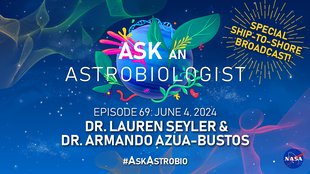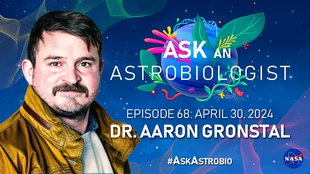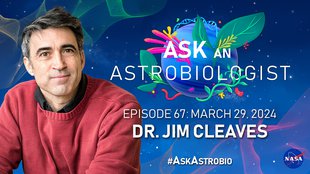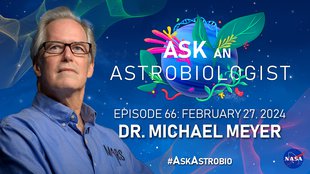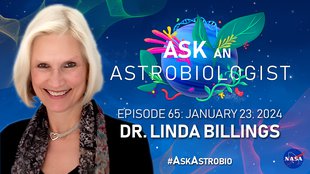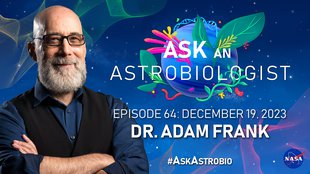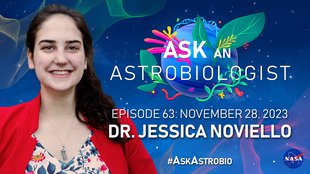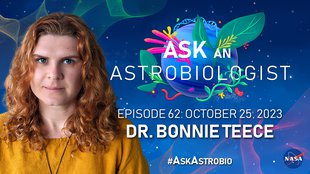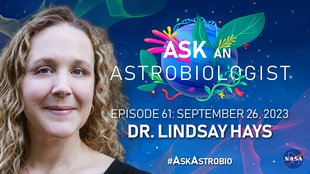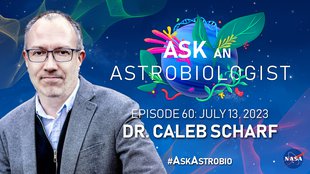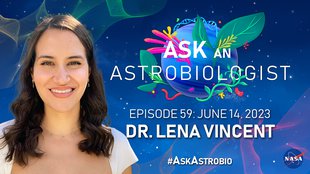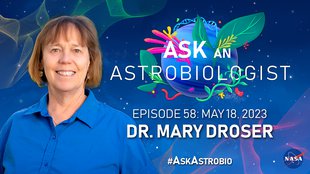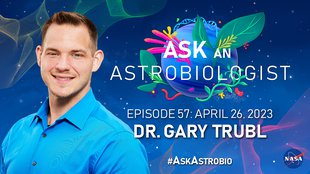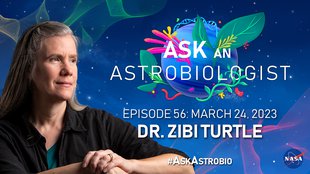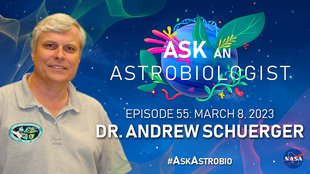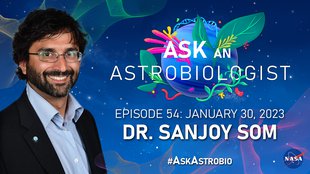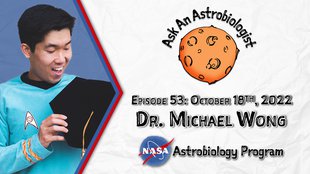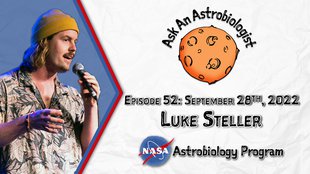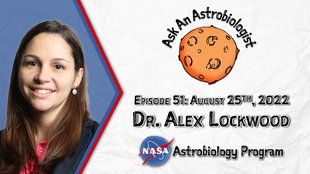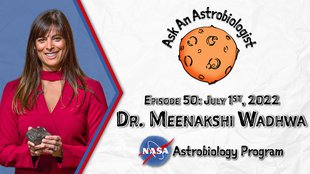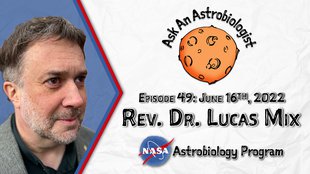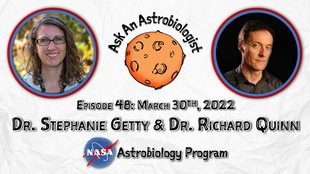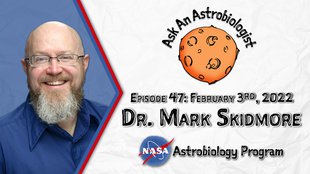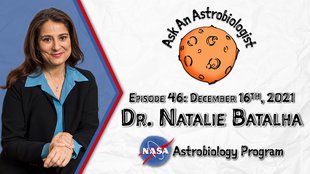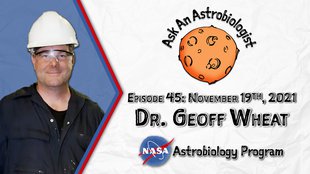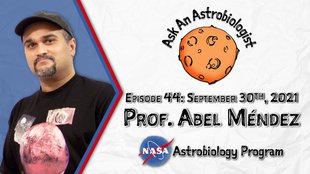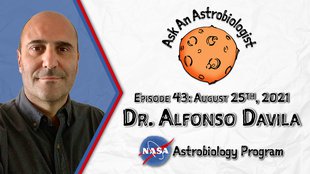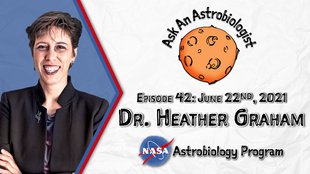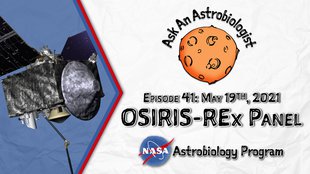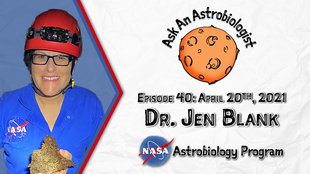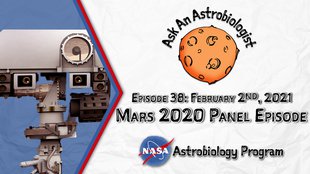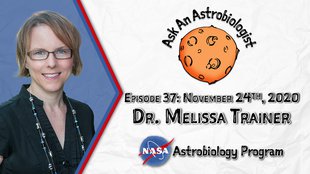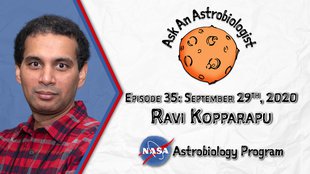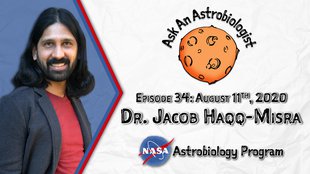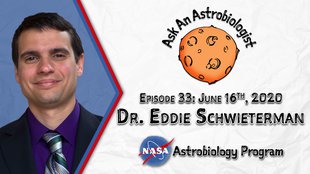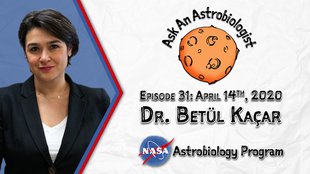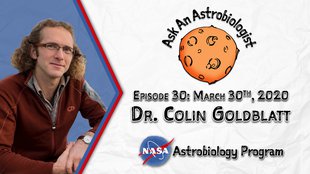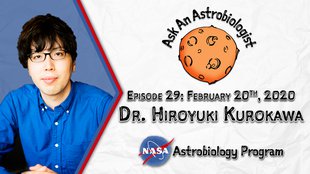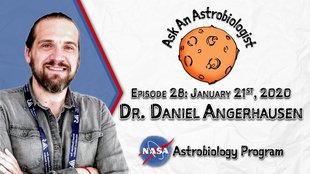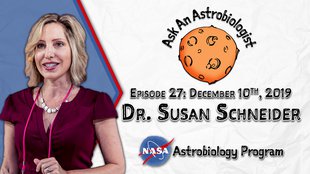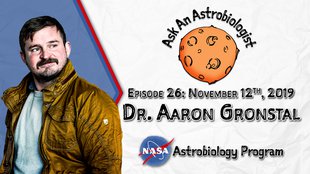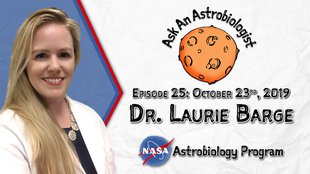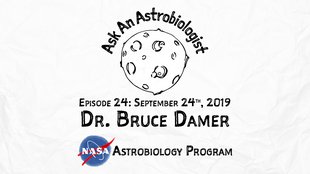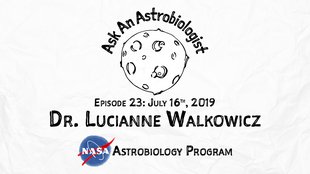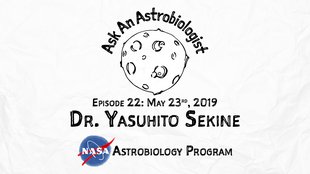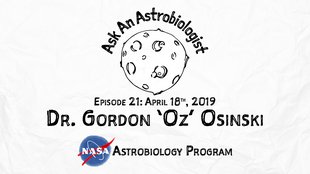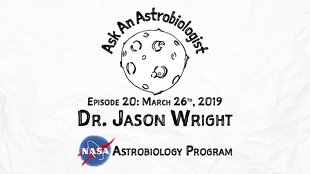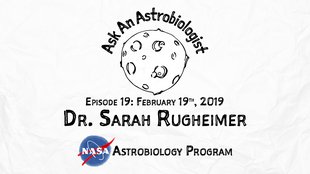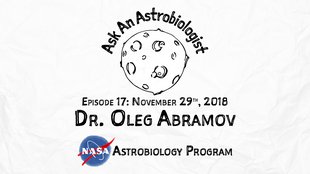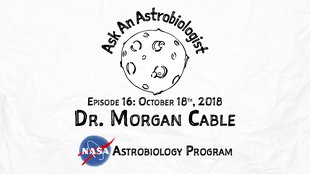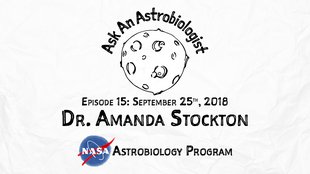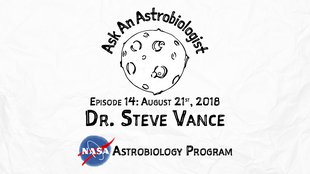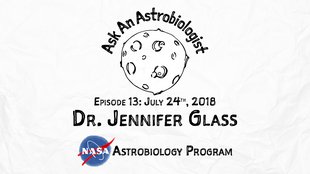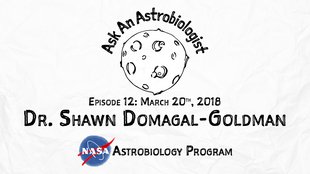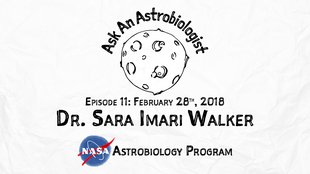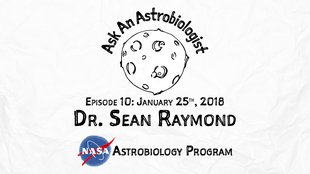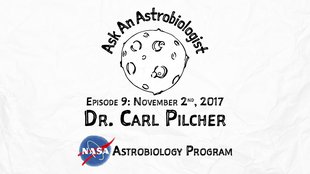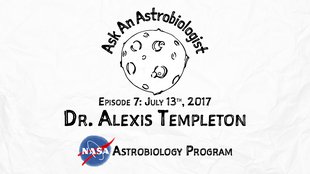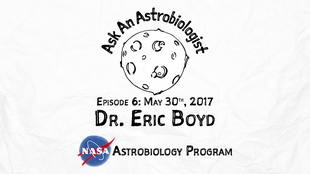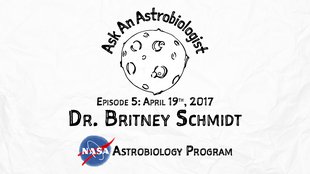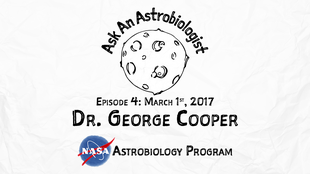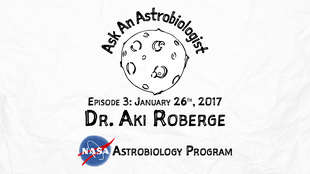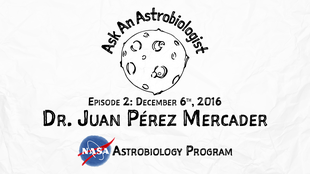
We welcome to SAGANet Dr. Charles Cockell, Director of the UK Center for Astrobiology and Professor of Astrobiology at the University of Edinburgh!
You can read more about Dr. Cockell and his work here.
Hello friends of astrobiology. Welcome to our brand new show on SAGANet, Ask An Astrobiologist. It replaces our previous show Talk to an Astrobiologist. The reason we're upgrading our format a little bit is because we got new resources from the NASA Astrobiology Program as well as ELSI, the Earth Life Science Institute at Tokyo Tech, and the non-profit Blue Marble Space Institute for Science, to make this a little bit more dynamic and hopefully a bit more interactive and informational for you all. If you have any questions during the program, make sure you use the hashtag #AskAstrobio to post your questions online or use the SAGANet chat if you are a member of SAGANet.org.
Other Recent Episodes
Ocean World Science Aboard the Ship 'Falkor Too' with Drs. Lauren Seyler & Armando Azua-Bustos
The Art of How to Become an Astrobiologist with Dr. Aaron Gronstal
How & When Do Molecules Become Life with Dr. Henderson "Jim" Cleaves
It's my great pleasure to invite back to SAGANet Dr. Charles Cockell. Charles is a professor of astrobiology, one of the few in the world who holds this title. The University of Edinburgh in Scotland. He's also the director of the UK Center for Astrobiology and all around baller astrobiologist. If you have not taken his course on Coursera on the introduction to astrobiology, I highly recommend it. Charles are you wearing a mining suit? Did you just spend the last few hours one kilometer below the surface of the Earth?
Yeah. It's good to talk to you again Sanjoy. I know it's exactly where I've been actually by coincidence. This interview was like 20 minutes after I came up from our underground astrobiology lab in the Boulby mine where we've been studying life deep in 250 million year old Permian salt deposits. We've been down there today doing some science, collecting microbes, filming with the National Geographic. Then I literally got up 20 minutes before this interview. That's why I'm in an orange mining suit. I'm not actually in prison. I've just been down the mine collecting some samples, doing some filming, and working in our lab. Which, I should say is actually the first astrobiology lab to be built underground. It's an exciting facility that we have.
That's so cool. The Permian is about 250 million years ago so let's grab it. Before that, tell us a little bit about your childhood.
It's 250 million year old salt deposits. It's very old. It's not as old say, as the early Mars but it is an environment where we can look at microbes living in salt environments and try and understand how they live in different types of brines. In the mine we've got sulfate brines. We've got sodium chloride brines. All the sorts of salts that you see on Mars. It's a really interesting place to look at microbial communities in extreme briny environments and understand how they adapt to those extremes. It might tell us something about the sort of adaptations and functional capabilities of microbes living in briny environment on early Mars.
Brines also really important for thinking about life on Europa. But I want to go back a little bit before that because you're an astrobiologist today but when you were a kid, when you were growing up I would like to learn a bit more about what events made you become a scientist and how you ended up finding the astrobiology field and choosing that as a career.
I'll try keep it really brief because this is a long story. I actually began, well I was interested in natural history from a very young age. I used to collect moths and insects and things. Then when I went to school I couldn't decide between bio chemistry or astrophysics. I decided in the end to bio chemistry. That's what I did my first degree in. Then I got a fascination in genetic engineering and did medical molecular biology for my PhD at Oxford. I actually studied the proteins involved in blood clotting. That didn't really satisfy me. I had an interest in space exploration, astrobiology. I spent one summer doing my PhD at the International Space University where I met what would become future colleagues at NASA Ames Research Center. Then I got a post-doctoral position at the National Research Council Associateship at NASA Ames and went out and did a post op. That's really when I became a sort of proper astrobiologist if you like.
I spent four and a half years at NASA and then I came back to the UK. I worked for the British Antarctic Survey and then I spent four years working on Antarctic research. Then I got my professorship in astrobiology at the open university. My career has taken different directions from bio chemistry to molecular biology to astrobiology. But all the time I've always tried to link biology with space exploration. That's always the thing that's fascinated me and now I find myself as a professor of astrobiology doing it full time. It's been my childhood dream of a job. I'm very lucky I think.
You get to spend a day one kilometer below the Earth's surface, which is pretty awesome. The path you've taken I'm sure was not a straightforward one. I was wondering if you could tell us a little bit about the hurdles you encountered and the mentors you met you helped you along the way to become the amazing scientist you are today.
I'll defer on the amazing scientist. It's for all the people to make a judgment but I can tell you about the hurdles I crossed to get where I am. One of the most difficult things I think is funding and building a career. People see you as a professor and they think, he must have had an easy time or got there easily. I went out to NASA and they ran out of money. I had to go and scrounge for money for eight months from Stanford. Then I ran out of money there and went down to the University of Arizona where I then ran out of money there. Then I went back up to Ames and ran out of money there. Then went to the British Antarctic Survey for two years. When I first came back to the UK to do research here, then I ran out of money after two years. It's not an easy thing. It's taken a lot of times of difficulty and uncertainty with research positions. That's not to depress people, it's more to give people hope that you just have to keep going and be persistent. It's not actually easy for anyone developing a career in science.
But if you believe strongly enough in what you're doing and keep going, things tend to work themselves out. It just takes focus and a lot of work. ... I know it sounds like a simple piece of advice but being productive is one of the most important things for achieving a permanent position and getting a job at a university. As long as you are productive, you demonstrate that as a scientist you can get information out there. I think that's an important thing. Persistence, being enthusiastic, believing in the dream that you're pursuing, but at the same time also getting those papers written and being productive. You can't really beat that combination of things.
I go with those sentiments and I agree. As a personal scientist myself, I definitely appreciate the challenges of obtaining money to do science. Could you tell us a little bit about the mentors you've had throughout your career and the advice of wise people you've taken and that have helped you guide your career?
Yeah, I've been lucky a lot of people helped me out. People at Ames, Chris McKay, Lynn Rothschild, others who supported my career when I became and astrobiologist. Without their support this wouldn't have happened. I should also say not just mentors but colleagues as well. People I've worked with at Ames when I was a post op fellow scientist who were supportive as well. I had a lot of support from senior people. Barry Bloomberg who was the first director of the NASA Astrobiology Institute and Nobel Prize winner wrote me letters of support for my jobs after I finished at NASA. It's not necessary but it doesn't hurt rather, to have Nobel Prize winners writing reference letters for jobs. People listening shouldn't think you need that.
I guess it is an illustration. That it is important to work with senior people and be positive towards your seniors. Whatever they might tell you and that's certainly part to the help that you need to develop a job. I've been lucky. A lot of people have been very supportive of what I wanted to do in life and have supported me at critical times. I have no hesitation saying that the papers and the dream and the vision is important but it is also important to try and get to know people who can help you out at critical times.
I don't think it's luck Charles. You are very good at communicating your enthusiasm and it's pretty contagious to the people around you. Give yourself some credit there.
Yeah, I mean there's hard work. You don't get anything for free in life. It can always look like to other people you've been lucky and very little of it is luck. It's hard work and persistence. But the good news is that we live in a world these days where persistence and hard work does actually pay off. I think a few centuries ago it was much more about who you knew and there was a lot of luck. That's a good thing that if you believe in what you're doing and people want to be asked for biologists. If you show that persistence, you have a high chance of getting what you want. You just have to keep pushing on.
That's excellent advice. One thing I really like about you Charles is you are a very bold scientist. The experiments you carry out are just really awesome. I was wondering if you could tell us a little bit about the experiments you actually flew into space.
Yeah. We have done space experiments too, International Space Station. I really want to go to the moon and Mars. I should say that this is really just the first step but I'm not going to complain anyway. We've been lucky. We've had European Space Station experiments where space agency experiments are one of which was quite fun. We took some rocks from a cliff in the south of England in a place called Devon, a fishing village. We took the rocks and we flew them on the outside of the International Space Station for a year and a half to ask a very simple science experiment, which was a science question. Which was to ask did any microbes survive that year and a half in space. One species survived and we have that growing in our astrobiology now. We're trying to understand how it survived in space.
Two of the answers are that it forms bio films and that it's also very resistant to ionizing radiation. That was really the first experiment that I did on the space station. Currently we're preparing another experiment that's going to fly in two years, which I'm PI of, called Bio Rock. It's to look at how microbes break down rocks in microgravity and simulated Martian gravity using cubic centrifuge on the space station. This is all about growing bio films in regular on Mars and on the moon. Whether we can use microbes to break down rocks produce soils and maybe eve do things like bio mining. Extracting useful elements from rocks like iron and titanium and precious metals like platinum from asteroids and use microbes to do this work for us just as microbes are used on the Earth to do bio mining.
This is a really exciting experiment. It's leading to a new generation of microbial growth reactors that we're building with Kaiser Space who are our industrial collaborators. What we hope to do in the next three or four years is build tiny little cubic microbial growth chambers that you can fly on cube stats or on space stations or send to the moon and, which you can do microbial growth experiments, microbial culture experiments. These are little modularized culture chambers if you like, that you can use in space. That's another one of our exciting space experiment.
Those microbes that do bio mining. I think that's really interesting because one of the big push from the private industry these days is to do asteroid mining. Is the kinetics of the micro break down fast enough? Is it scalable? It seems like it's really good for a small project but on the larger scale ...
About 20 percent will serve all the copper on the Earth today as extracted from rocks using bio mining. This is not speculation, this is a massive economic enterprise on the Earth. Yes, in microbes ... you can think of them simply as catalysts for accelerating say the oxidation of iron or sulfur into sulfuric acid and acidifying the rock environment to break down rocks. Microbes can catalyze chemical reactions or it's in magnitude. Sometimes up to a million times faster than just purely chemical reactions. That general ability of microbes to catalyze reactions is at the heart of bio mining. Whether that's specifically extracting particular metals from rocks, or just using microbes to help break down the silicate matrix of rocks and release economically useful elements. Yes, microbes can do this on a big scale.
How you would do that on an asteroid or on the moon or Mars when on the Earth, these microbes generally do this in aerobic environments where they've got plenty of oxygen. You have to get the oxygen and that's an energy and mass cost to do all that. Scaling up by mining to extraterrestrial environments is at the moment something we don't fully understand whether it would be economically scalable. I think that's yet to be demonstrated. But it is just one of the ways in which we could use microbes, use organisms to do things for us in space that might improve our ability to get access to resources or meteoric soils or even do things like use microbes for extraterrestrial gardening's. Something as trivial as growing plants and microbial mats in stations on the moon and Mars. Microbes can do that work.
If we were to think about the long term human space flight, we'll definitely need to have an understanding of how microbes work in the space environment. It's cool that this is one of many examples of practical astrobiology and you can't talk about geology without talking about biology and vice versa. It's very exciting field. You're also conducting, if I remember right, one of the longest running astrobiology experiments. You started something and the experiment is going to last like 500 years or something? Can you tell us about that?
Yeah. Sure. I was having a conversation with some of my students in my lab. We were saying what is the mathematical function that describes the loss of viability of the desiccated microbe. Whether that's a microbe that's dried on the surface of Mars, or a microbe in permafrost on Earth. What is it that killed the microbe over long time periods? Is it accumulated DNA damage? Or is it just damage to the cell membrane over a short period of time? We looked around and of course, we found papers where people had looked at survival of desiccation of microbes. There's a paper about nostoc, which is a sign of bacteria surviving for over a hundred years. That was some Hibernian specimens that people had got out of a botanical collection.
All these papers are quite half hazard. They're some articles that people have found in museums or in other places. We thought why don't we do the experiment properly and set up a 500 year microbiology experiment? That's what we've done. What we've done is we sealed up Chroococcidiopsis, which is a desiccation resistant sign of bacterium and spores of Bacillus subtilis. We've got a vegetative and a spore forming microbe, we seal them in glass vials. What will happen is we take a triplicate vial every two years for the next 25 years and then every 25 years to the next 475 years. The experiment ends on June the 30th 2514. In the experimental box we've got vials that are just exposed to the environment that it's just in the box. Then we also have vials inside a lead box to cut down some of the background radiation to test the hypothesis that background radiation is one factor in loss of viability.
Then the entire experiment is reproduced. One of these experiments is in Edinburgh and we have a complete replicate 500 year experiment that's been curated by the Natural History Museum in London to ensure there's redundancy but it also means we get two data sets from two different environments. We've got biological triplicates in each experiment. Then the whole experiment is technically replicated in two institutes. We took the first time point this year. The experiment began two years ago. July this year was time point one, which was a matter of great excitement in my lab. I can tell you now that neither organism significantly lost any viability in both the exposed and in the lead boxes. That's good news for a number of reasons. Not because it tells us much. We know that spores will survive two years, that's a short time period. We know that Chroococcidiopsis will survive for two years. What it has shown us is that the preservation method that we used for the microbes has worked.
We have an experiment now. After two years there's no loss of viability. Now the question is what will happen over the next ... will we see a sudden crash in viability? Maybe over the next few years as those organisms die or will we see a crash in viability say in a 150 years when there's a certain accumulated level of DNA damage? What is the difference between a vegetative cell and a spore forming cell? Then even if the cells die. Let's say in a hundred years they're all dead, we can still follow the destruction of bio signatures over 500 years. What happens to the membranes and the DNA and nucleic acids or proteins? This experiment provides us with an understanding of the degradation of biological micro molecules over century time scales. We're very excited about it.
I can tell. Does it have applications for life on Mars?
I think it does. Of course, Mars has a much higher radiation exposure on the surface but it might tell us something about life underground that's desiccated in a dormant state and what the processes are of loss of viability. I mean, I should say 500 years, it's still a short experiment on a microbial time scale. Microbes probably can survive millennial in permafrost or completely desiccated. The purpose of the experiment was to try and get to time scales that are more reflective of microbial time scales than human time scales.
That's very cool. I'd like to change gears a little bit here. You're a professor. You're a director of the UK Center for Astrobiology. You do all this amazing science and yet you have time to write a book. An Astrobiology textbook for that matter for undergraduates. Where did you find the time? How do you do it? Tell us more about the process that lead to this book.
I went to Edinburgh about five years ago. That's when I set up the center. Of course, I need to teach. One of the things I wanted to teach was astrobiology. After a couple of years of teaching physics just to get to know the undergraduates and how the university works, I set up an astrobiology course at Edinburgh. It's been very popular. It attracts students from 11 different departments across the university from ... sciences. As part of that lecture course, I needed to write lecture notes for my students to go with the lectures. I wrote all my lecture notes and at the end of the first year of teaching, I looked at all my notes and thought, hang on. This is 50 percent of a textbook. Why don't I just write the other 50 percent and then I can publish a textbook. Then I won't have to write lecture notes. I can just tell my students to go buy the book in the book shop.
At the end of the day it is actually a time saving move to write a textbook. It'll be updated by Wiley, hopefully. Then it can be used in other universities. Actually slightly more seriously the other reason for doing it is I thought I've got all this experience with teaching astrobiology in a university. I know now, which lectures work and, which material students found exciting. It just seemed like a really good idea to write a text book that could be used in other universities to save other people the time of having to reinvent astrobiology courses and figure out all the things that I've taken three years to figure out with what to teach in mind. I should also say that I wrote 21 lectures and Power Points slides that you can get on the Wiley website for free. They go alongside the lecture notes. They're based on my own lectures. If anyone out there wants to set up an astrobiology course at a university, you can download 21 lectures that have 50 minutes’ worth of Power Points and then you use the textbook and you have an instant astrobiology course.
Another motive for writing this textbook was trying to encourage people to set up more astrobiology courses in universities around the world. As you know, the more astrobiology courses there are the better for all of us. It just means there's more astrobiologists, more support for astrobiology. In summary, the reason why I did it is because I'd written 50 percent of a textbook already. It seemed like a small step to make a big impact in improving astrobiology around the world in universities. That's why I wrote it. It's fun to write. I like writing. This was not a chore for me. It was something fun to do.
Good for you Charles. I read a few chapters and it's very easy to read and very well designed textbook. Good job. Before we open it up to the public because we'll be talking for roughly half an hour, I have one more thing I'd like to ask you. At the mine you're at now, Boulby Mine, your organization a course next year based on NASA Spaceward Bound. Could you tell us a bit more? When is it going to be held? What it's about?
Yeah. It's in October. It's a collaboration between the Boulby underground science society here where we're doing astrobiology and NASA Spaceward Bound. It's to test instrumentation to do science in a deep subsurface environment and also to do education and outreach in the mine a kilometer underground. Although people can also work on the surface and do outreach activities here. We've put out a general call that you can find on the UK Center for Astrobiology website or you can contact me directly. My email is on my website. We're inviting anyone with really good science, good technology or good outreach that involves understanding life deep underground ... for the sub surface exploration the moon or Mars or just doing good outreach and astrobiology and underground science to take part in this.
Then what we'll do is we'll look at all the proposals and come up with a program. It's October next year. The ninth to the 24th I think. I've completely forgotten the date. It's midway through October. It's two weeks. It's in Whitby. It's not just in Yorkshire. The mine is just north of [inaudible 24:26]. It's great fun as well. It's a fantastic environment to work with. You will meet other people working in astrobiology and outreach. We already have JPL involved so they're going to be here testing Mars 2020 instruments. It's going to be a really fantastic two weeks. Anyone interested in joining us please get in contact and send us in ... all it takes is a half-page proposal on your experiments and what you plan to do. Then you can wear one of these very stylish orange jumpsuits like I'm wearing now.
That's great. As an alumni of two NASA Spaceward Bound programs, I love the combination of science and outreach that's just a testament to the program. It's not just science, it's not just outreach, it's both and both thoroughly, which is awesome.
Exactly.
Definitely those of you who are excited about those two topics, science and outreach together, I'd really consider Charles and Spaceward Bound program next October. That sums up all the questions I had. I am scanning the Twitter feed right now and just checking the chat to see if there are any questions. There's one from JP Heavy Industries, @JPHeavy, who asks, what would a methane based ecology look like on, say Titan?
That's interesting. Titan has a bit of a problem because it's at about 94 Kelvin, which is some way below what we think is the lower temperature limit for life. Certainly there's the raw material for life there. Lots of organic materials, complex organic materials, and interesting photo chemical cycle that's generating complex organics. The sort of things you might build living things from. Although, we haven't yet detected things like amino acids and sugars. That's yet to be demonstrated. But the real problem is, can you have life working at 94 Kelvin? There have been some interesting ideas about life on Titan. For example, I did from Chris McKay and Heather Smith at NASA Ames who proposed life using an acetylene and hydrogen as an energy source. There are molecules as well on Titan that might be plausible reduction observation reactions for getting energy.
I think still the problem remains what's the solvent liquid methane maybe but liquid methane has some disadvantages with respect to doing dissolving polar substances and doing the sorts of things that we associate with bio chemistry. I think the real problem is lowing temperature. You might say maybe life is just working very, very slowly there at literally glacial time scales. Organisms just divide every few hundred million years but it's very difficult to get reasonable kinetics going at those temperatures where you conceive of an organism that can adapt to changes in environmental conditions that we associate even with environments like Titan. Titan is a dynamic world despite the low temperatures. Can you have an organism that can adapt to those changes quick enough when it's operating at 94 Kelvin? I think that's an interesting question to ask.
It's a bit warmer underground. There is a liquid ocean but it's between ice. It's not contacting with rocks so I'm still not convinced it's a great place for life.
Absolutely. Maybe that's what the question it was asking. Yes, if there's a subsurface ocean that would be another question altogether. If there's liquid water, even maybe liquid water and ammonia mixed ocean, that might be a more plausible environment for life than the near surface environment.
Agreed. Let's see, what else is on the Twitter feed on the SAGANet chat? Ben Pierce asks where will we find the first evidence of life beyond Earth? Will it be Earth? Europa? Maybe an exoplanet?
My guess is as good as anyone. Where do I know where life is? It's an interesting question because there is a possibility that we might find life and an exoplanet before we find life in our own solar system. Unless there's life in Enceladus and Europa that's being spewed out into space in plumes, that might be relatively easy to capture. Organizing itself for return mission or a life detection mission to Europa and Enceladus to sample those plumes may well be a decade or more in the future. Finding evidence for life on Mars might require drilling into the sub surface. That could be a decade or a few decades ahead to really get good samples out that unequivocally show life. Within that period of a couple of decades, it's not impossible that we might be able to find an oxygen bio signature on an exoplanet.
I think it would be remarkable in astrobiology if we actually found evidence of life beyond our own solar system before we found life in our own solar system. Who knows? We may find we're in a biological desert and that all Earth like exoplanets have no other life. In which case we're back to searching for life in our solar system. My guess as to where we'll find life is no better than anyone else's guess. I don't know but what's exciting, what's really exciting for astrobiologist is the discovery of liquid water environments in our own solar system and beyond. Discovery of super Earth that may be ocean world, the discovery of liquid water coming out Enceladus, liquid water in Europa extraordinary evidence for long live water bodies and particularly sediments on the surface of Mars. Incredible images from curiosity of sedimentary layers.
All of these things provide us with the impotence to search for life regardless of whether we actually find it or not. I think my summary would be we've got plenty of places to look for it and that's the good news.
What does your intuition lead you to in terms of where in our solar system you think life is? Just gut feeling. Tough question. Sorry.
It depends what time I wake up in the morning and what I ate that day. Sometimes I look at pictures of sedimentary Aztec and by curiosity in a volcanic environment they look like Iceland. You just think, is it really the case that all of those sediments that curiosity has studied were completely sterile. I find it difficult to believe that they are. Then another day I'll see a news story about plumes on Enceladus and I'll just think that's incredible that you have large water bodies. In the case of Europa that have two times as much liquid water as the Earth's oceans combined. You think how can that completely sterile? Maybe these places are. It's very difficult for us on the Earth to accept the idea of large bodies of liquid water that are habitable but completely sterile.
That's a paradigm that's very alien to ecologists and to most of us as biologists. But it's possible that these places never had an origin of life or life was never successfully transferred to them from the Earth. Then they may be sterile. I don't know. I go from optimism to less optimism depending on what I thought about and what papers I've read. That's something with astrobiology. The fact that there are these incredible environments that have liquid water that look like plausible locations for life. Are they inhabited or not? That's what we all really want to find out.
Definitely good for our civilization to go and find out. I think the answer to that question will have not only very profound scientific implications but also philosophical ones as well. That would be good for us to think about. Graham Lau, hi Graham. Has a question. I think it's a very good one. You taught on course era, you reached many thousands of people with your class but his question is more how can we I guess share astrobiology in a more hands on manner than just listening to lectures online? What are your thoughts on that?
I think that's a really good question. I think there's a huge amount of potential. Sometimes there is some out there. For example, the Citizen Science Exoplanet Projects looking for exoplanets in data that's been set back by Kepler and being produced by other ... there are projects where there's a possibility of real hands on projects. I think looking at the Mars curiosity images and orbital images is something that can be handed over to citizen science. It would be great to come up with more lab basic experiments. There are people currently trying to build desktop models chambers that you can make by 3D printing. I had a conversation with people who are building 3D printed Mars simulation chambers. I think again, with 3D printing maybe there are planetary simulation chambers that people can build at home and do real astrobiology type experiments.
But I think his question is a really good one. I think if anyone out there has ideas for hands on astrobiology experiments either through citizen science type projects or things that people can buy and do experiments in their own homes that would be a fantastic avenue for increasing the outreach of astrobiology on a more popular level. Also, giving people who are not professional astrobiologists the chance to do real experiments.
I surmise it's definitely still a young field that needs a lot of ideas from the early career community and how to make it grow. There's a question that asteroid mining ... sorry. There's a question on asteroid mining by Elizabeth Frank. Hi Elizabeth. Regarding are you the first one to do microbes on asteroids in terms of bio mining or is there an established literature on that, that you're building on?
There's a couple of papers out there where people have looked at microbes growing on meteoritic material in the lab. There's a couple of papers by Mortner who grew plants actually as well as microbes on chondritic carbonaceous chondrites. It's not the first time anyone's looked at whether things would grow on meteorites and things will grow on meteorites. Meteorites are just silicate rocks and there's plenty of good stuff in there for things to grow in. I think ours is the first experiment that has been approved for space flight. Certainly the first experiment proposed for a space station that are deliberately on applying and the use of microbes to break down rocks and play a role in bio mining and also in other microbial mediated reactions and useful things we can do with regulate from other planetary bodies.
That's fascinating. Another question from Penny Boston. Hi Penny. She asks, biofilms are so central to the microbial way of life here on Earth. Do you think that a biofilm lifestyle is going to be a lifestyle choice of microbes everywhere in the galaxy?
That's a really good question. Hi Penny, by the way. I'm really glad you could make it. Yeah, I think so. As Penny knows, these bio films are everywhere in extreme environments and caves and other situations. Very few microbes in the natural world live alone. We call these things unicellular organisms but very microbes are truly unicellular. That's generally an artifact of the laboratory. When you go into natural environments, microbes collaborate in a whole variety of ways. Either ... microbes as energy source as another microbes waste. They collaborate in terms of extracting nutrients from rocks. One microbe might excrete an acid that will break down rocks that helps the whole community to grow. They cycle elements as well. Carbon, sulfur, nitrogen, all these elements cycle through bio films through different types of microbes.
I think on any planet where you have microbes there has to be a very strong evolution selection pressure for those microbes to start cooperating in the Darwinian struggle for survival in the classical view of that. It's biologically inconceivable you would have microbes just sitting on a planetary surface just doing their own thing completely separated because somewhere in that mixture of microbes there's going to be a selective advantage for two microbes to work together, even as they say if it's just one microbe using another microbes waste as an energy source. I think there has to be drive towards bio films. I think on any planet where you had microbes you would find things growing in bio films.
Great question Penny. Thanks. Graham has another one. Good question again. Tickle the brain here. If you are allowed to say one sentence on a future golden record that would be sent to space that summarizes humanity almost, what would you say? In addition to that, what would you put on that record?
My message would be we do good things as well you know.
Indeed.
Sorry. That's a very cynical reply. You know the alien species was watching what we get up to I think they would be in despair. We do, do a lot. There's a serious side to that comment. Astrobiology, the search for life beyond the Earth for me at least is one of the things that demonstrates the best in our civilization. I'm not just saying that because I want funding. I really mean that. Asking the question of are we alone in the universe, I don't know of any other species on the Earth that asks that question. All other species attack each other. They do warfare obviously in a more rudimentary way than us. A lot of the things that we do that are bad are products of animal instincts. Asking questions like, what's the universe made of? Is there life out there? These are questions that really define us as a pieces that can think as a civilization that can go beyond purely animal instincts.
I would like to think that these are things that we would want to tell other species in the universe. That yeah, we have our failings and we have our faults. If you were observing our planet, you'd probably see some quite bad stuff going on. But we also think about these higher level questions. There really is hope for our civilization to break beyond violence and destruction and to move out into the universe and contribute in a very positive way if there are other species out there. That would be my message to other species. Maybe they would recognize that. If they are species at the end of a food chain, maybe they understand aggression as an evolutionary product. I feel like ... the role. We actually do good stuff as well. They might actually understand that and understand the conflict in ourselves and in our civilization and the work that we have to do to try to reach beyond destruction to the positive side of our natures. I think all intelligent species have that conflict.
That's some beautiful work Charles. Did you get that Graham? Yeah, I agree with you. That astrobiology is a very unifying as a discipline because looking up at the stars and wondering what's out there is definitely not something that's limited to individual pockets on the Earth. Everybody has done that and it makes for wonderful conversations. The fact that we can tackle that scientifically in this early 21st century is an awesome time to be alive. Astrobiology is a fairly young field as you know. What do you think are the challenges going to face in the future? There's no yet, the department of astrobiology and personally I think that's probably a good thing. But how do you see the field evolving and maturing I guess?
I'm not the first one ... I agree that one of astrobiology's biggest challenges is that it's so broad. It's difficult to condense it into a single field. When you can put up a building and say that's the department of x, y, z, it's a lot easier to get funding because people can put you in a pigeon hold and they can understand what you're trying to do. Astrobiology is so broad. It's sometimes difficult for people to understand what we're really doing because we ask these very broad questions. That's also its strength. That's one of the most exciting things about astrobiology is it cuts across disciplinary boundaries and that's why some of the most exciting sciences. It's a challenge I think ahead. This is a challenge I see at Edinburgh and I don't think a unique challenge. It's trying to consolidate around particular questions. In my case, the study of life in extremes. Other people have other questions in astrobiology.
To try and keep that momentum going and creating new jobs, new funding that can sustain a new generation. A really sad thing to see is lots of people coming up in ... not sufficient jobs that give them permanent positions in universities. That's not just unique to astrobiology, it's true of a lot of science. In astrobiology, we also have to confront that challenge of trying to keep the momentum of the field going. I would say to anyone listening who's an early career researcher, don't forget astrobiology if you go into a university and get a conventional job in something like microbiology and astronomy. Do really make an effort to set up astrobiology undergraduate lecture courses. They're incredibly popular among students but what that also does is it will keep momentum and critical mass in astrobiology going globally by keeping it healthy in universities. I think that's a really important way of addressing the challenge of critical mass and sustainability. Keep that excitement and those courses going in academic institutions.
Yeah, here I have to do a little parenthesis and thank the NASA Astrobiology Program and Institute for really being supportive of the early career network. Especially so there are conferences like AbGradCon, which has been formative for me and I know for others. Let's see. Any other questions do I see online? There's one by Ingrid and I think you've tackled this one already a little bit. She was asking if contact was made with ET what kind of scientist would be the ones making that contact? But I think astrobiologist are the ones who are going to make that contact. Whether it's geologists or biologists or astronomers depends where we find that life. What are your thoughts?
I agree. That's what astrobiology is for. That's one of the things we're supposed to do is be that connection if that ever happened. Of course, that's a very optimistic thing to happen in the field. We'll be very happy if we find microbes on another planet. That'll give us plenty of work to do. Yes, thinking hypothetically if we made contact with an intelligent entity like that, I think that astrobiologists would play that role because astrobiologists bring together astronomers, geo scientists, ethicists all under one subject. The astrobiology community would be the obvious community to try and find a particular expertise that was needed at the time. Whether that's reproducing a signal we might astronomers with instruments, whether that's deciding on the ethical implications, or if it was a contact that actually happened for real, a being actually landed on Earth and you need some biologists and some bio chemists to figure out what's going on. Whatever the situation is, astrobiology I think probably has the widest diversity of expertise that could be brought to bear on that challenge of dealing with that situation.
Agreed. There's a great question by Julia. Hi Julia. Who's asking about phosphorus. As you know, phosphorus is a key element for life on Earth but how would we find that on the moons in the outer solar system?
Phosphorus detect is not really my expertise but there are electromechanical methods of detecting phosphorus in liquids or in rocks. You can also look at particular minerals for example using XRD and XRF, are two methods. X-ray florescence and x-ray diffraction. X-ray florescence will give you the elemental composition of rocks. That used to find phosphorus for example on Mars. It's been demonstrated in Martian rocks. X-ray diffraction gives you information on particular minerals so you could find things like apatite, which is a phosphate mineral. If you're looking in liquids like the plumes of Enceladus, then you might want some electrode that will detect phosphorus or phosphate compounds oxidation states of phosphorus rather in liquids. There are enormous number of chemical and x-ray mineralogical methods of detecting phosphorus in different states and liquid and rocks that will be used in future planets [inaudible] on the surface of Mars to detect phosphate containing rocks.
That's a good question because that actually rightly points out phosphorus is one of the “CHNOPS” elements. At least for life on Earth is an essential ingredient to things like nucleic acids, other molecules such as adenosine triphosphate and parts of enzymes as well. Looking for phosphorus is a key part of bio chemistry of astrobiology.
We're getting close on time. We have time for one more question and I see Graham's one up there on bio minerals. You talked about a little bit about detecting bio minerals on other worlds. What are your favorite instruments? What would you like to see on a Mars rover?
Now I'm going to be flippant again. My favorite instrument is a human being. Again, I'm still laughing but there's a serious side to it as well. Very, very difficult to detect truly bio minerals even on the Earth when you find minerals in extreme environments. You have to do a lot of deductions, whether they have been produced by biology or whether they are the product of abiotic chemical reactions. The way around that is to look at the structure of the minerals to see whether they're associated with micro fossils, whether they contain isotopic signatures of life. Maybe carbon fractionation, negative delta C13 values of that sort of thing that might tell you the biology has been involved in the formation. Whether that's things like carbonate, different iron minerals.
Ultimately, to produce a suite of minerals on a rover that will truly detect a bio mineral and say that's life is a very, very difficult thing to do. It's difficult on Earth. It's difficult when you're trying to put it on a rover. I am a true supporter of sending humans to places like Mars with a laboratory and time on their hands, a good year or so on the surface to do science, to use sophisticated instruments to be able to go back into the field and collect samples in a real time way. Unless we stumble across something on Mars using a rover that's unequivocally biological, the best way at least to look at the possibility of biology on Mars over larger areas, even if you find life on Mars, look at the spatial distribution of bio minerals and life on Mars, it's to send human explorers there in the long term.
That's to say, even if we did find evidence of life using a Rover, a bio mineral, you still can't beat having a human there for a year in a lab going out and collecting a vast number of samples and looking at spatial distribution and looking at different types of minerals, collecting fresh samples based on samples they've looked at say the day before or the week before. I am a fan of the human exploration of Mars. Of course, that's not so easy to implement for places like Europa with extreme radiation or Enceladus. For those sorts of environments, if we want to look for minerals that have interacted with biology, we at least for the near term we're limited to robotic missions.
I think if we do microbes elsewhere, they'll be another big conversation about whether or not it's Earth contaminants before we make the claim that it's extraterrestrial. Charles, this has been absolutely delightful. Thank you so much for taking the time in your fantastic orange jumpsuit chatting with us today about your career and your words of wisdom on astrobiology. Any last words of wisdom you want to share?
No, I just want to say thank you for inviting me to take part in this. It's been a pleasure as usual. My only last comment is to everyone out there, particularly early career researchers, stick with astrobiology. It's an incredibly exciting field with a lot of great stuff that's going to happen over the coming decades. Wherever you end up and whatever type of scientific career, remain amongst the astrobiology community because it's a great field to be in. I encourage you to keep involved and keep contributing. Thanks a lot again for inviting me. It's been great.
Cheers Charles. Thank you. Listeners, join us next month for As An Astrobiologist. Our guest will be Dr. Penny Boston herself. Until then, stay curious and ciao for now.
